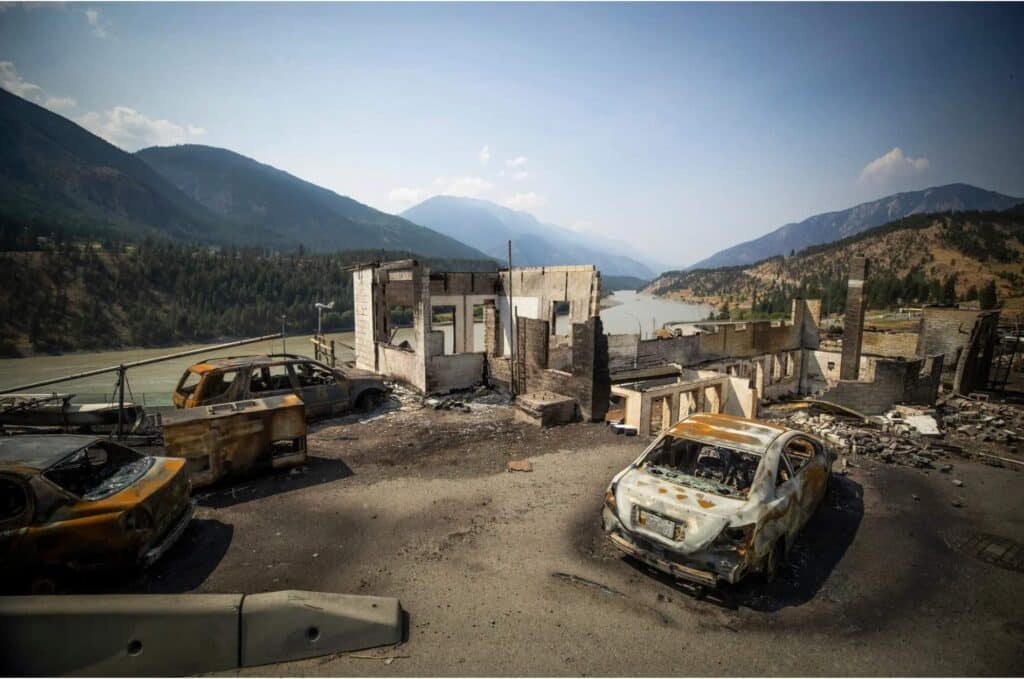
The aftermath of the temperatures ranging from 116 to 121 degrees Celsius in Lytton, British Columbia. (Photo: Darryl Dyck via The Canadian Press )
In the wake of Canada’s most devastating fire season on record, the small town of Lytton offers a haunting image of how rising temperatures are affecting our lives. Engulfed by flames in a matter of minutes, Lytton experienced a tragedy that’s a wake-up call for a country. As residents like retired Kanaka Bar Indian Band Chief Patrick Michell strive to rebuild not just homes but a future safeguarded against escalating climate extremes, their story becomes a lesson for us all. Lytton’s ongoing struggle for recovery offers a blueprint for resilience. Lytton’s tragedy and struggle to rebuild serves as a wake-up call for immediate action against the kinds of climate threats we’ve faced this summer.
This year marks Canada’s worst fire season in modern history, a grim milestone that raises serious concerns and questions about the future. The fear that fire seasons will become even longer and more intense is real and deeply unsettling. Impacts of the climate crisis require continued and urgent action from all levels of government. For many years, severe wildfires in Canada have been increasing in frequency, duration and intensity. Towns have been consumed by fire and homes destroyed.
On the sprawling flatlands of British Columbia’s Fraser Canyon, where heat becomes trapped under daily inversion layers, the small town of Lytton has long been known as Canada’s hottest spot. On June 30, 2021, an unprecedented disaster transformed Lytton overnight and proved that the existential threat of climate change affects communities everywhere.
This year marks Canada’s worst fire season in modern history, a grim record that raises serious concerns and questions about the future. The fear that fire seasons will become even longer and more intense is real and deeply unsettling.
On an afternoon in Lytton, with temperatures pushing 50 C during an intense and prolonged heat wave, a fire engulfed the town. Within hours, 90 per cent of Lytton lay in ashes as an inferno raged across the dry landscape. More than 250 residents were forced to flee with nothing but the clothes on their backs as their homes and possessions were reduced to cinders. In addition to those residents, 1,500 to 2,000 First Nations residents living nearby on reserves were severely affected. The damage was so severe that evacuation orders remain in some areas despite the passage of over two years.
The cause was apparent: a growing cycle of unrelenting heat, drought and fierce winds that created land conditions that nature and infrastructure were ill-equipped to withstand. For Kanaka Bar Indian Band elder Patrick Michell and others choosing to rebuild their lives in Lytton, the goals extend beyond simply reconstructing what was lost. Their collective long-term mission is to forge a town and region with the ability to shelter inhabitants from escalating climate extremes.
The damage from the Lytton fire was so severe, that evacuation orders remain in some areas despite the passage of over two years.
Since the fire, residents like retired Kanaka Bar Indian Band Chief Patrick Michell- have embarked on an arduous journey of recovery — one that demands not only physical rebuilding but psychological and emotional healing. Displaced for the long haul as critical infrastructure and planning processes move at a slow pace, many battle ongoing financial hardship and uncertainty.
Some are forced to leave their homes for long periods because rebuilding important facilities and planning are moving slowly.
Through it all, Chief Michell has emerged as a dedicated leader, gathering input from locals to hammer out solutions, while incorporating traditional land knowledge with modern tools and design. Beyond physical rebuilding, Chief Michell stresses the need for urgent societal shift to safeguard lives. “If we don’t start investing, adapting and future-proofing our systems, we lose them,” he says. “We must prepare communities capable of weathering wildfires, rains and the more volatile conditions we are living with now, with more coming ahead.”
But, Canada has a habit of not learning from past mistakes. While the fire in Lytton took place two years ago, we’re seeing similar wildfire impacts around the country today.
This year, Canada is facing its most severe wildfire season in recorded history. The situation has led to the displacement of thousands of people and has had far-reaching effects, including visible thick clouds of smoke across parts of Canada and the United States.
In the Northwest Territories alone, more than 200 fires are actively burning, while nearly 400 are ablaze in British Columbia.
Canada has a habit of not learning from past mistakes.
For Chief Michell, sharing stories provides hope that momentum for change persists despite setbacks. Through gatherings that leave attendees feeling newly inspired, he urges mitigating emissions by divesting from fossil fuels, and rolling up sleeves locally. Never one to back down in the face of adversity, Chief Michell has a vision for Lytton that could be a model for overcoming disaster in communities worldwide.
Because rebuilding important facilities and planning are moving slowly, residents are faced with ongoing financial problems and uncertainty.
Even though resources are limited, the hard work needed in Lytton shows why areas most affected by climate change need support. Dealing with climate change head-on entails global solidarity with the places that are bearing the brunt of climate impacts.
“Do not go gently into that good night,” Chief Michell says, referencing a poem by Dylan Thomas. Getting involved and leaving behind fossil fuel reliance offers a path to a livable future. The lingering impacts of Lytton’s disaster serve as a reminder that we must come together. As community and region leaders in Lytton forge ahead with recovery, their efforts offer lessons worldwide on overcoming trauma to foster more resilient communities.
Charged Up is the story of you — of all of us — on a mission for a cleaner, healthier charged-up Canada.



